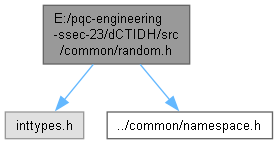Loading...
Searching...
No Matches
Include dependency graph for random.h:

This graph shows which files directly or indirectly include this file:

Go to the source code of this file.
Macros | |
| #define | random_boundedl1 COMMON(random_boundedl1) |
| #define | random_coin COMMON(random_coin) |
Functions | |
| int64_t | random_coin (uint64_t num, uint64_t den) |
| void | random_wombats (uint8_t *key, const long long numkeys, const long long batch_start, const long long batch_stop, const long long batch_sumykeys) |
Macro Definition Documentation
◆ random_boundedl1
◆ random_coin
Function Documentation
◆ random_coin()
◆ random_wombats()
| void random_wombats | ( | uint8_t * | key, |
| const long long | numkeys, | ||
| const long long | batch_start, | ||
| const long long | batch_stop, | ||
| const long long | batch_sumykeys | ||
| ) |
Definition at line 15 of file random.c.
16{
20 for (;;)
21 { /* rejection-sampling loop */
28
32
33#ifdef ENABLE_CT_TESTING
35#endif
37 continue;
38
40 ells[j] = 0;
41
44
46 {
48 {
49 // r[j] &= 1;
53 }
54 }
55
58
59 return;
60 }
61}
References batch_start, batch_stop, i, int32_sort, j, and randombytes().
Here is the call graph for this function:

